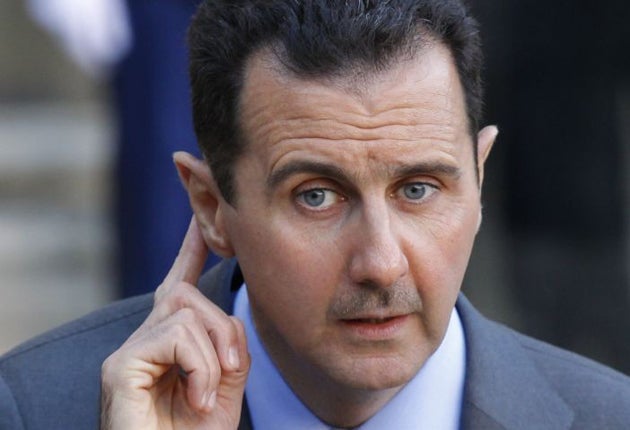Living in fear, Hama residents forced to bury bodies in parks

Your support helps us to tell the story
From reproductive rights to climate change to Big Tech, The Independent is on the ground when the story is developing. Whether it's investigating the financials of Elon Musk's pro-Trump PAC or producing our latest documentary, 'The A Word', which shines a light on the American women fighting for reproductive rights, we know how important it is to parse out the facts from the messaging.
At such a critical moment in US history, we need reporters on the ground. Your donation allows us to keep sending journalists to speak to both sides of the story.
The Independent is trusted by Americans across the entire political spectrum. And unlike many other quality news outlets, we choose not to lock Americans out of our reporting and analysis with paywalls. We believe quality journalism should be available to everyone, paid for by those who can afford it.
Your support makes all the difference.Witnesses have described appalling conditions in the besieged Syrian city of Hama, with relatives being forced to bury bodies in town parks and newborn babies dying in their cots due to power cuts. In accounts given to The Independent yesterday, residents from Hama described the state of fear which has gripped the city since government forces began a deadly onslaught on Sunday.
Their stories come a day after the UN Security Council issued a statement condemning events in Syria – a move human rights groups dismissed as a "completely inadequate" response to President Bashar al-Assad's bloody crackdown on protests that erupted in March. Rights activists say at least 100 people have been killed in the attack on Hama, during which neighbourhoods have been subjected to heavy shelling, tanks have stormed the city centre, and plain-clothed gunmen have reportedly shot civilians at random. The Syrian Observatory for Human Rights has said 1,000 families have fled their homes in the city.
One witness, who escaped to a village outside Hama yesterday afternoon, said by telephone that residents were being forced to bury their loved ones in parks because they were too scared to go to the graveyards. The man, who did not want to be named, said: "It's true, they are burying people in the city's parks. But these young protesters are winning, and the people who are buried in the parks are saints." Other accounts given to news agencies told similar stories, though they have not been possible to verify.
Phones, internet access and electricity inside Hama have been severely restricted for days. Residents said they were being forced to ration their supplies to survive the month of Ramadan, when Muslims fast from dawn until dusk. One resident from Hama said in an email that troops had cut the electricity supplies to two of the main hospitals in the city. "They have a fuel generator but the army is not letting any fuel into the city, so many of the newborn babies in the hospital have died," he claimed. The witness also said people delivering bread from neighbouring villages were being shot by security forces, though it was not possible to verify his claims.
Late on Wednesday and after months of wrangling, the UN Security Council issued a statement condemning the regime of Mr Assad for attacking his own civilians. It called on the government to launch a political dialogue with its opponents, yet stopped short of issuing a resolution – the strongest reprimand available to members.
In response, Mr Assad yesterday issued two legislative decrees allowing the formation of political parties, but activists inside Syria said the actions by Mr Assad and the UN were too little too late. One man, a member of an organisation calling itself the Coalition of Free Damascenes for Peaceful Change, said people were "really angry with the UN". He added: "We don't have any hope that any international organisation is going to help the Syrian situation."
Amnesty International also issued a statement condemning the UN's response as "completely inadequate". "After more than four months of violent crackdown on predominantly peaceful dissent in Syria, it is deeply disappointing that the best the Security Council can come up with is a limp statement that is not legally binding," said Jose Luis Diaz, the group's representative to the UN.
Hama, which for decades was a hotbed of anti-government dissent, was largely outside government control until Sunday's offensive. Back in 1982 it was the scene of a notorious massacre when the current President's father killed anywhere between 10,000 and 25,000 civilians in a bid to crush a Muslim Brotherhood uprising.
Join our commenting forum
Join thought-provoking conversations, follow other Independent readers and see their replies
Comments